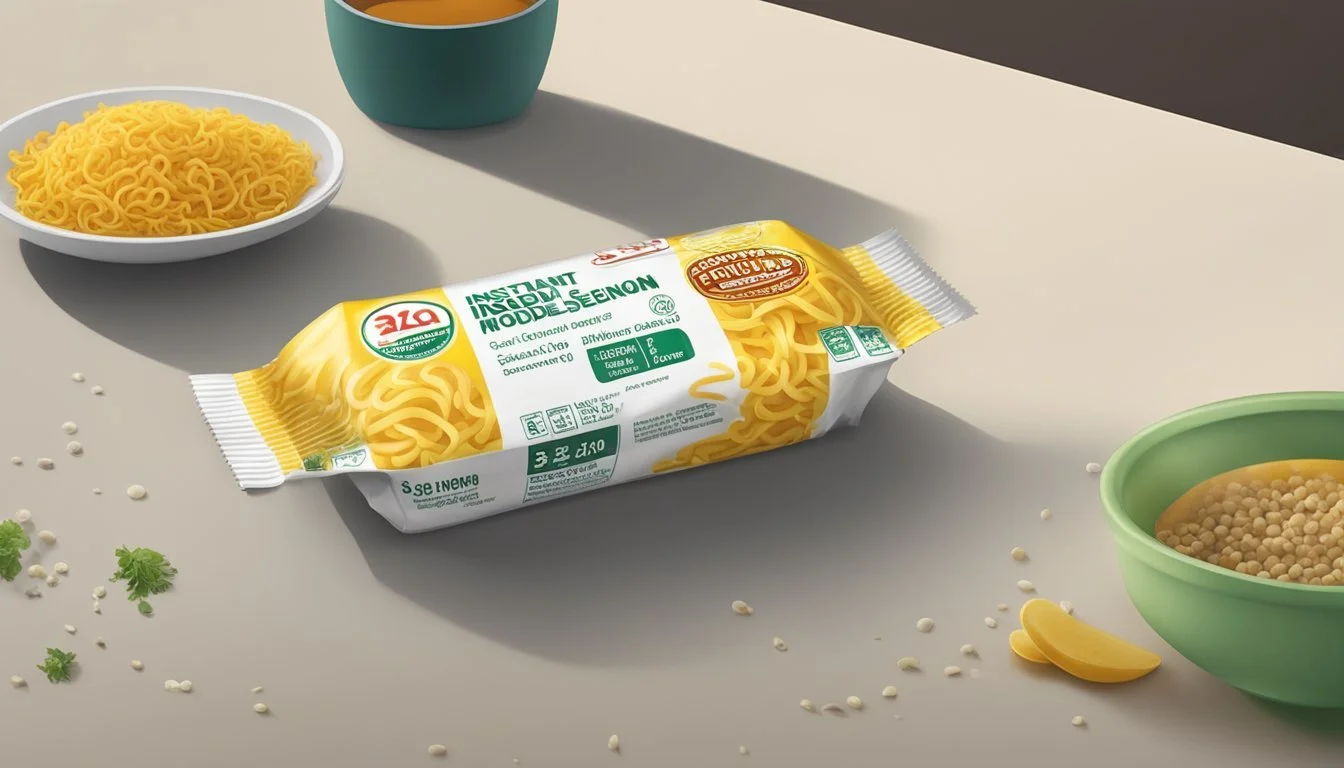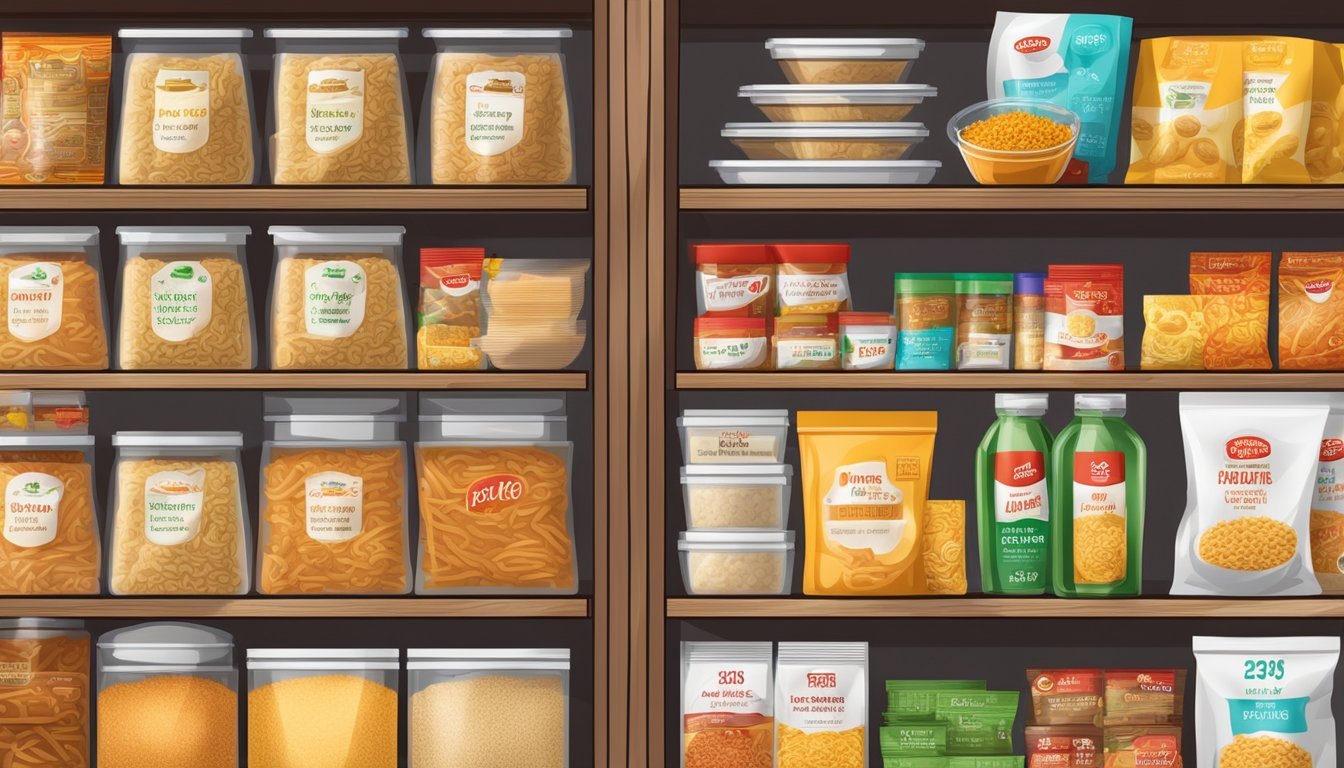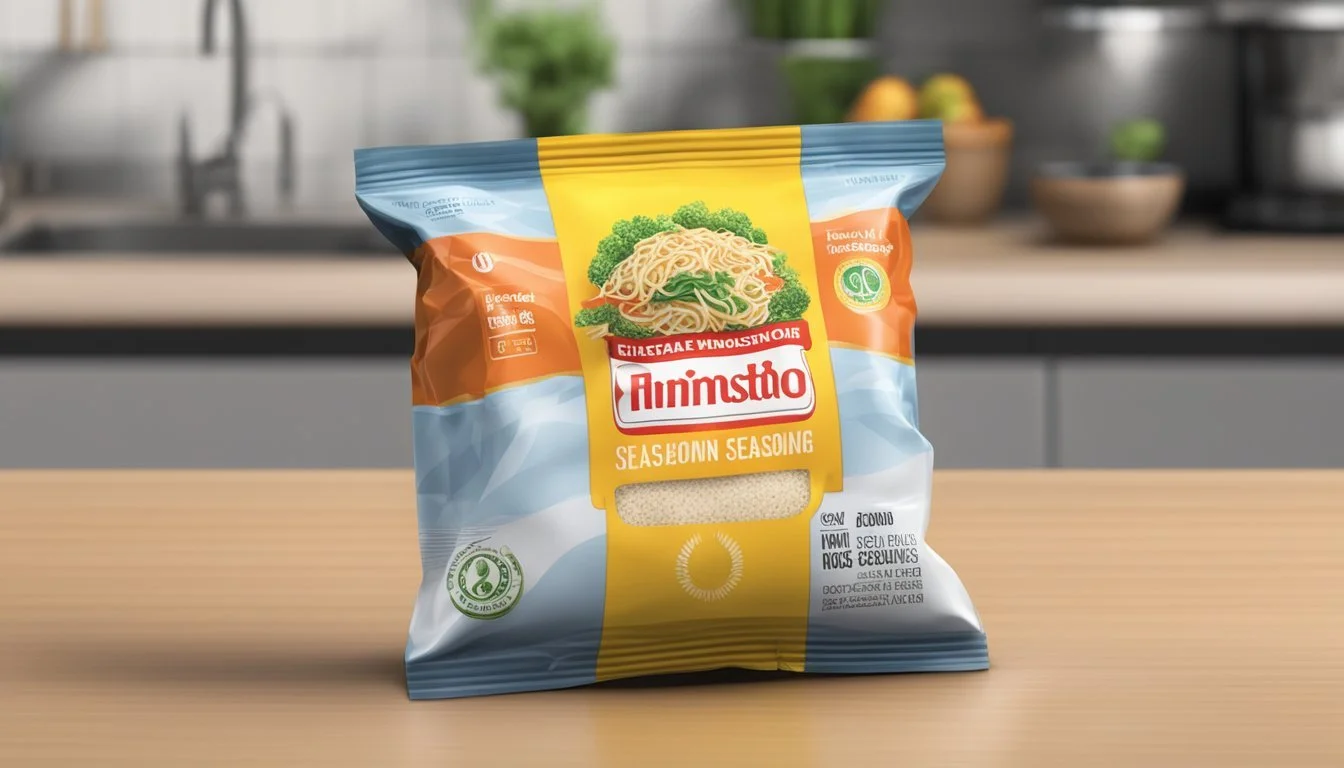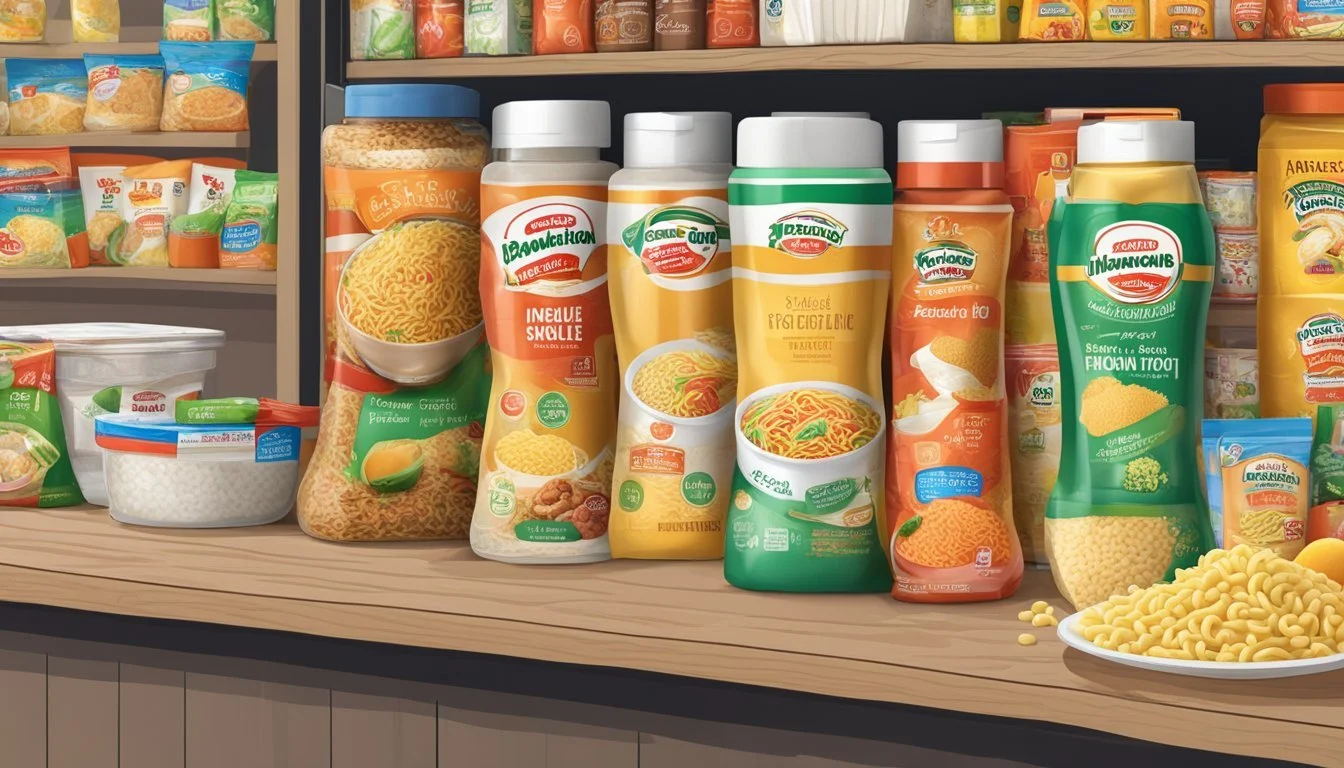Does Instant Noodle Seasoning Expire?
Understanding Shelf Life and Safety
Instant noodle seasoning packets are a common staple in many households, but a question often arises: do they expire? While the noodles themselves have a shelf life that can extend beyond the printed date, the seasoning packets are also subject to lifespan limitations. Yes, instant noodle seasoning packets do expire and should be checked for recommended "best by" or expiration dates to ensure they are safe to eat.
Factors like storage conditions and packaging integrity play significant roles in how long the seasoning maintains its flavor and quality. Unopened packets generally last longer, but once the packaging is compromised, the risk of spoilage increases. It's not uncommon for the contents to become caked, dried out, or even moldy if stored improperly.
For those who consume instant noodles regularly, it is advisable to periodically check the seasoning packets for any signs of degradation, like changes in color or texture. Consuming seasoning past its expiration date might not pose immediate health risks, but it can result in a less enjoyable meal experience.
Understanding Food Expiration Dates
Food expiration dates play a crucial role in determining the safety and quality of consumable products. Key elements to consider include the distinction between 'best by' and 'use by' labels, as well as the impact of preservatives on shelf life.
Decoding 'Best By' and 'Use By' Labels
'Best by' and 'use by' dates provide essential information about a food product's quality and shelf life.
'Best by' date indicates when a product is at its peak flavor and quality.
'Use by' date is more critical, suggesting the last day the product is considered safe to consume.
Ignoring these dates can sometimes lead to a decline in nutritional value and taste, but it doesn't always mean the product is spoiled immediately. Always inspect for signs of spoilage, such as mold or off smells, to ensure food safety.
The Role of Preservatives in Shelf Life
Preservatives are vital in extending the shelf life of food products.
Chemical preservatives like BHA and BHT prevent oxidation, keeping foods safer for longer.
Natural preservatives such as salt and sugar help inhibit bacterial growth.
These substances maintain the product’s quality, preventing it from becoming unsafe or unappetizing. Proper storage conditions, such as keeping instant noodles dry and away from heat, further enhance longevity.
Preservatives ensure that products stay nutritious and safe for a more extended period than they would without them. This is essential for maintaining food safety and quality over time.
Specifics of Instant Noodle Shelf Life
Instant noodles can last much longer than fresh noodles due to their production process and the influence of preservatives. Different factors affect their durability, and their shelf life is significantly longer than fresh alternatives.
Factors Influencing Instant Noodle Durability
Preservatives: Instant noodles often contain preservatives that extend their shelf life. Ingredients like TBHQ (tertiary butylhydroquinone) help keep them stable for an extended period. These chemicals prevent spoilage and maintain the quality of the product.
Storage: Proper storage is crucial for maintaining the shelf life of instant noodles. Keeping them in a cool, dry place away from direct sunlight ensures they stay good for a longer time. Moisture and extreme temperatures can significantly reduce their durability.
Packaging: The airtight packaging of instant noodles plays a vital role in preserving their condition. It prevents exposure to air and moisture, which are primary factors in food spoilage. Unopened packets can remain fresh much longer than those exposed.
Comparing Shelf Life: Instant vs. Fresh Noodles
Shelf Life: Instant noodles boast an impressive shelf life, often lasting up to 18 months beyond their expiration date when stored correctly. In contrast, fresh noodles typically last only a few days in the refrigerator due to their lack of preservatives.
Texture and Quality: Over time, the texture and taste of instant noodles may degrade, but they are still generally safe to eat well past their expiration date. Fresh noodles lose their quality much more quickly, becoming mushy or hard.
Convenience: The long shelf life of instant noodles makes them a convenient pantry item, suitable for long-term storage. Fresh noodles, while typically offering a superior texture and flavor, lack this longevity and require more immediate consumption.
Proper Storage Practices for Instant Noodles
Proper storage of instant noodles is crucial to maintain their quality and safety. Key factors include storage environment, the type of packaging, and the use of airtight containers.
Maintaining Optimal Conditions
Instant noodles should be stored in a cool, dry place to prevent spoilage.
Humidity and direct sunlight can degrade the noodles' quality, leading to soggy texture and diminished flavor. A pantry or cupboard away from heat sources is ideal. Temperatures should be consistently below 75°F (24°C), as higher temperatures can accelerate the degradation process.
Regularly check storage areas for any signs of moisture or pests. Ensuring these conditions will prolong the shelf life and retain the original taste and texture of the noodles.
The Impact of Packaging
Packaging plays a significant role in preserving instant noodles.
Unopened packets provide a layer of protection against moisture, air, and contaminants. It is important to inspect the packaging for any tears, holes, or breaches before storage. Damaged packaging can result in exposure to air and humidity, compromising the noodles' quality.
If packaging is compromised, transferring the noodles to an airtight container can help maintain freshness. Properly sealed packaging is essential for retaining their taste and structural integrity.
Effective Airtight Containers
Utilizing airtight containers is a highly effective method for prolonging the shelf life of instant noodles.
By minimizing exposure to air and humidity, airtight containers help preserve the noodles' quality and prevent stale or spoiled products. Glass jars, food-grade plastic containers, and resealable bags with a tight seal are suitable options.
Ensure the containers are kept in a cool, dry place away from direct sunlight. Regularly inspect the containers for any cracks or damage to maintain their effectiveness. Using airtight containers is particularly beneficial if the original packaging is compromised or if the noodles are purchased in bulk.
Identifying Spoiled Instant Noodles
Expired instant noodles can pose risks to both flavor and health. It is essential to identify spoilage to avoid potential issues like food poisoning.
Signs and Symptoms of Noodle Spoilage
Mold Growth: One of the most noticeable signs of spoiled instant noodles is mold. Green or black spots on the noodles or seasoning packets indicate mold growth, rendering them inedible.
Odor: Fresh instant noodles have a neutral smell. If there is a sour or rancid odor, it suggests bacterial contamination.
Discoloration: Noodles should maintain their original color. Yellowing or other unusual discolorations are a red flag indicating spoilage.
Texture Changes: Spoiled noodles may become sticky or soggy inside the packaging. This textural change implies that moisture has, somehow, penetrated the packaging, compromising the quality.
Risks of Eating Expired Instant Noodles
Food Poisoning: Consuming spoiled or expired instant noodles can lead to food poisoning. Symptoms may include nausea, vomiting, and diarrhea. This occurs due to harmful bacteria such as E. coli which can develop on expired food.
Bacterial Growth: Expired noodles, especially if improperly stored, can harbor bacteria. Ingesting such bacteria can result in severe health issues.
Decreased Quality: Beyond health risks, expired noodles often lose their flavor and texture, leading to an unsatisfying eating experience.
Nutritional Loss: The longer noodles sit past their expiration date, the more they may lose nutritional value. Even if technically safe, the quality and benefits of the noodles may be significantly reduced.
Enhancing the Taste and Quality of Instant Noodles
Enhancing the taste and quality of instant noodles involves using seasoning packets wisely and adding innovative toppings and ingredients.
Using Seasoning Packets Wisely
Seasoning packets play a vital role in defining the flavor profile of instant noodles. To achieve the best results, it is important to adjust the quantity based on personal taste preferences and health considerations.
For example, reducing the amount of seasoning can help control salt intake while still providing a flavorful meal.
Additionally, combining the provided seasoning with fresh or dried herbs like parsley, basil, or chives can add depth and freshness to the dish without overwhelming the original flavors.
It is also beneficial to mix the seasoning thoroughly with the noodles to ensure an even coating, which enhances the overall taste experience.
Innovative Add-Ins and Toppings
Innovative add-ins and toppings can significantly elevate the texture and taste of instant noodles. Adding fresh or leftover vegetables such as bell peppers, spinach, or carrots not only boosts nutritional value but also introduces a variety of textures and flavors.
Seafood like shrimp or fish can provide a rich, savory taste and make the meal more substantial. In addition, fried or soft-boiled eggs complement instant noodles by offering a creamy texture and additional protein.
Other options include tofu, cooked chicken, or beef slices to further enhance the dish. Popular toppings include green onions, sesame seeds, and a drizzle of sesame oil for added aroma and flavor.
Experimenting with these ingredients can transform a simple bowl of instant noodles into a more satisfying and gourmet-like experience.
Health and Nutrition Aspects
The health and nutritional aspects of instant noodle seasoning packages are important to consider as they can significantly impact food safety and overall diet quality.
Evaluating Sodium Content and Preservatives
Instant noodle seasoning is known for its high sodium content. A single packet can contain up to 1,500 milligrams of sodium, which approaches or exceeds the daily recommended limit for many individuals. Excessive sodium intake can lead to hypertension and other cardiovascular issues.
In addition to sodium, preservatives are used to extend the shelf life of the seasoning. Common preservatives include tertiary butylhydroquinone (TBHQ) and butylated hydroxyanisole (BHA). Both are generally recognized as safe when used within regulatory limits, but excessive consumption may pose health risks.
Balancing Instant Noodles in a Nutritious Diet
While instant noodle seasoning adds flavor, it often lacks essential nutrients. It is primarily composed of salt, dried vegetables, and spices. Nutritional improvements can be made by adding fresh ingredients like vegetables, lean proteins, and whole grains to the dish.
To balance the nutritional value, consumers should consider reducing the amount of seasoning used. Complementing instant noodles with nutrient-dense food items can improve the overall quality of the meal and mitigate the effects of high sodium and preservatives.
Using these strategies can help maintain a healthier diet without entirely giving up the convenience and taste of instant noodles.
Extending Shelf Life and Preventing Waste
To maximize the shelf life of instant noodles and minimize waste, certain storage and usage practices can be very helpful. Proper storage techniques ensure the noodles and their seasoning packets remain safe and flavorful for extended periods.
Can You Refrigerate or Freeze Instant Noodles?
Refrigerating or freezing instant noodles, both pre-cooked and uncooked, can extend their usability. Pre-cooked noodles retain their texture better if refrigerated for up to a week, making quick meals more convenient.
Freezing instant noodles can further extend their shelf life by several months. It's essential to place the noodles in an airtight container or freezer bag to prevent freezer burn and maintain quality.
Storage tips: Always store noodles in a cool, dry place, away from direct sunlight. Seal any open packets tightly to avoid moisture interference, which can lead to spoilage.
Donation Options: Food Banks and Community Centers
If you have excess instant noodles, donating them to food banks or community centers can prevent waste and help those in need. Many organizations accept non-perishable items like instant noodles.
Before donating, check the expiration date to ensure the items are still usable. Most food banks prefer long-lasting items that don’t require special storage conditions.
Pre-packaged and sealed noodles are ideal for donation as they guarantee safety and quality. Community centers benefit greatly from such donations, helping to provide meals for various community programs.
By taking these steps, the shelf life of instant noodles can be optimized, and unneeded items can find a valuable new purpose.
Debunking Myths About Instant Noodles
Common myths about instant noodles often raise concerns about safety and quality. This section addresses misconceptions and explains the manufacturing process, which ensures a lengthy shelf life.
Misconceptions About Instant Noodle Expiration
Many believe instant noodles expire quickly. Actually, due to their dehydration process, they have a long shelf life. Misconceptions about expiration often stem from misunderstandings about how noodles are preserved.
Storage conditions affect shelf life. Properly stored, unopened packets can last up to two years beyond the expiration date without significant loss of quality. Extreme temperatures and moisture are factors that contribute to faster degradation and potential bacterial growth. Packages compromised by tears or holes can also expedite spoilage.
Another myth is that instant noodles contain harmful preservatives or wax. There is no wax coating, and the preservatives used are safe and approved for consumption. Beliefs about immediate food poisoning if noodles are slightly past expiration are unfounded. Proper storage ensures they remain safe to eat for extended periods.
Understanding the Manufacturing Process
Instant noodles undergo a dehydration process that involves frying or air-drying. This method removes moisture, making it difficult for bacteria and mold to grow. It extends the shelf life significantly compared to fresh pasta.
The seasonings included are also dehydrated. Salt and other preservatives help prevent bacterial contamination. The seasoning packets, therefore, have similar longevity as the noodles themselves.
Extreme temperatures can compromise the product. It is vital to store noodles in cool, dry places to maintain quality. The manufacturing process ensures the product remains stable and safe under recommended storage conditions.
Instant noodles are made with public safety in mind. Modern manufacturing and stringent quality control measures ensure the product is safe long after leaving the factory.










